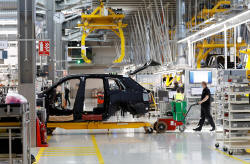UK manufacturers raise prices by most since 1980 - CBI
 Send a link to a friend
Send a link to a friend
 [October 21, 2021] By
David Milliken [October 21, 2021] By
David Milliken
LONDON (Reuters) -British manufacturers
raised prices by the most since 1980 over the past three months as they
sought to pass on rapidly rising costs for raw materials and manage
acute labour shortages, a long-running survey showed on Thursday.
The figures from the Confederation of British Industry are likely to
fuel concerns at the Bank of England that short-term inflation pressures
risk getting entrenched and could force it to start raising interest
rates as soon as next month.
Supply-chain bottlenecks have hit economies worldwide as they begin to
emerge from the COVID-19 pandemic, but Britain has been harder hit due
to new post-Brexit barriers to trade and immigration that took effect at
the start of this year.
"From higher material costs to labour shortages, manufacturers continue
to face a number of serious global supply challenges hampering their
ability to meet strong demand," CBI deputy chief economist Anna Leach
said.

Thursday's quarterly CBI survey showed manufacturers raised prices at
the fastest rate since April 1980 in the three months to October.
Expectations for price growth in the coming quarter also rose to their
highest in more than 40 years.
Costs faced by manufacturers rose at the fastest pace since 1980 in the
three months to July and slowed only slightly in the latest quarter. The
survey's gauge of cost expectations for the quarter ahead rose to its
highest since 1977.
Supply-chain bottlenecks mean manufacturers are reporting the
lowest-ever level of stocks, and the proportion reporting that a
shortage of skilled labour is holding back activity is its highest since
1974.
[to top of second column] |

A technician moves the body of a Rolls-Royce Cullinan on the
production line of the Rolls-Royce Goodwood factory, near Chichester,
Britain, September 1, 2020. REUTERS/Peter Nicholls

Last month the BoE warned inflation was likely to rise above 4% at the end of
this year and stick there until the second quarter of 2022, largely due to a
surge in natural gas prices that has hit manufacturers and consumers alike.
Energy prices have risen further since, and investors are betting the BoE will
become the first major central bank to raise interest rates on Nov. 3 after its
next meeting.
The picture for demand is more mixed. The CBI data showed the rate of growth in
orders slowed in October to its lowest since April as well as a big fall in
optimism.
Rising COVID-19 cases, the end of the government furlough programme and a higher
cost of living mean many economists think consumer demand is set to weaken - and
also that the BoE will defer a rate rise until early next year.
But the quarterly figures from the CBI still show better-than-average optimism
among manufacturers, alongside expectations that demand will pick up and that
output will continue to grow at an above-average pace.
(Reporting by David Milliken and Andy Bruce)
[© 2021 Thomson Reuters. All rights
reserved.] Copyright 2021 Reuters. All rights reserved. This material may not be published,
broadcast, rewritten or redistributed.
Thompson Reuters is solely responsible for this content.
 |